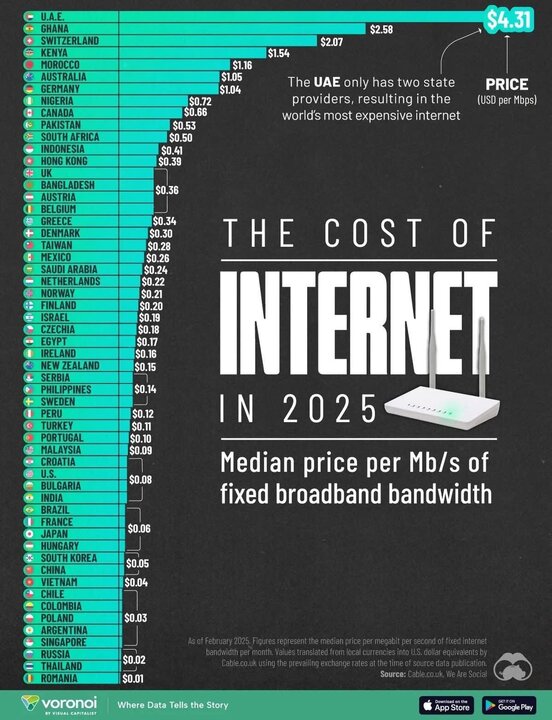
UAE Tops Global Ranking for Most Expensive Internet in 2025, While Romania Enjoys the Cheapest Rates
New data show vast global disparities in broadband costs, with Emirati users paying over 400 times more per megabit than Romanians
The United Arab Emirates has been ranked as the country with the most expensive fixed broadband internet in the world, with users paying a median rate of $4.31 per megabit per second, according to 2025 data compiled by Cable.co.uk and visualized by Visual Capitalist.
Analysts attribute the high price largely to the country’s limited competition—only two state-backed providers dominate the market.
At the other end of the spectrum, Romania enjoys the world’s cheapest fixed broadband, with residents paying just $0.01 per megabit.
Other nations with exceptionally low costs include Thailand and Russia at $0.02, and Singapore and Argentina at $0.03 per megabit.
The data highlight a staggering global divide, with internet affordability varying by more than 400-fold between the top and bottom of the list.
Ghana ranked second worldwide with a median cost of $2.58 per megabit, followed by Switzerland at $2.07, Kenya at $1.54, and Morocco at $1.16.
Meanwhile, major economies such as Germany ($1.04), Canada ($0.66), and the United Kingdom ($0.36) sit mid-table.
In contrast, the United States recorded an average of $0.08 per megabit, placing it among the more affordable developed markets.
Experts note that factors influencing pricing include competition, infrastructure maturity, regulatory policy, and reliance on imported bandwidth.
Countries with robust fiber networks and open markets—particularly in Eastern Europe and parts of Asia—tend to offer the lowest costs, while monopolized or semi-monopolized systems in wealthy nations can keep prices high despite superior infrastructure.
The report also underlines how access inequality remains a global economic issue.
While advanced economies in Europe and Asia are racing toward faster, cheaper connectivity, others—especially in Africa and the Middle East—continue to struggle with affordability and limited choice.
With broadband now fundamental to education, commerce, and governance, analysts warn that the cost gap may reinforce digital divides in productivity and opportunity worldwide.
Analysts attribute the high price largely to the country’s limited competition—only two state-backed providers dominate the market.
At the other end of the spectrum, Romania enjoys the world’s cheapest fixed broadband, with residents paying just $0.01 per megabit.
Other nations with exceptionally low costs include Thailand and Russia at $0.02, and Singapore and Argentina at $0.03 per megabit.
The data highlight a staggering global divide, with internet affordability varying by more than 400-fold between the top and bottom of the list.
Ghana ranked second worldwide with a median cost of $2.58 per megabit, followed by Switzerland at $2.07, Kenya at $1.54, and Morocco at $1.16.
Meanwhile, major economies such as Germany ($1.04), Canada ($0.66), and the United Kingdom ($0.36) sit mid-table.
In contrast, the United States recorded an average of $0.08 per megabit, placing it among the more affordable developed markets.
Experts note that factors influencing pricing include competition, infrastructure maturity, regulatory policy, and reliance on imported bandwidth.
Countries with robust fiber networks and open markets—particularly in Eastern Europe and parts of Asia—tend to offer the lowest costs, while monopolized or semi-monopolized systems in wealthy nations can keep prices high despite superior infrastructure.
The report also underlines how access inequality remains a global economic issue.
While advanced economies in Europe and Asia are racing toward faster, cheaper connectivity, others—especially in Africa and the Middle East—continue to struggle with affordability and limited choice.
With broadband now fundamental to education, commerce, and governance, analysts warn that the cost gap may reinforce digital divides in productivity and opportunity worldwide.
Translation:
Translated by AI










